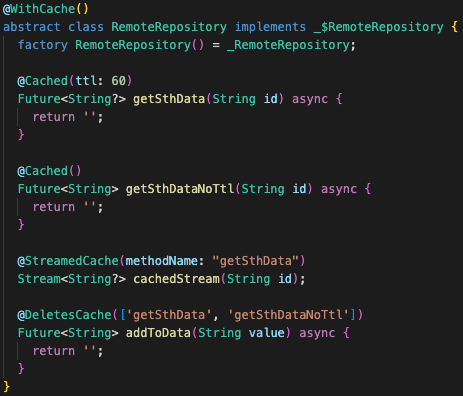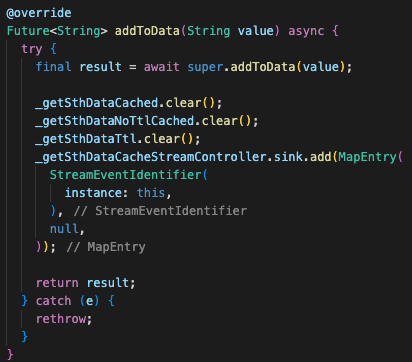Cached
Simple Dart package with build-in code generation. It simplifies and speedup creation of cache mechanism for dart classes.
Least Recently Used (LRU) cache algorithm
It is a finite key-value map using the Least Recently Used (LRU) algorithm, where the most recently-used items are "kept alive" while older, less-recently used items are evicted to make room for newer items.
Useful when you want to limit use of memory to only hold commonly-used things or cache some API calls.
Contents
Motivation
There is quite often situation, that you have to cache something in memory for later usage. Common case is cache some API calls and theirs responses. Usually, it is done in some data layer, probably in - let say - RemoteRepository
Oftentimes, the repository code might look like this:
class RemoteRepository implements Repository {
final SomeApiDataSource _dataSource;
final SomeResponseType? cachedResponse;
const RemoteRepository(this._dataSource);
@override
Future<SomeResponseType> getSthData() async {
if (cachedResponse != null) {
return cachedResponse;
}
cachedResponse = await _dataSource.getData();
return cachedResponse;
}
}
So, instead of doing it manually we can use library and write our RemoteRepository in that way:
@WithCache()
abstract class RemoteRepository implements Repository, _$RemoteRepository {
factory RemoteRepository({required SomeApiDataSource dataSource,}) = _RemoteRepository;
@Cached()
Future<SomeResponseType> getSthData() {
return dataSource.getData();
}
}
Setup
Install package
Run command:
flutter pub add --dev cached
flutter pub add cached_annotation
Or manually add the dependency in the pubspec.yaml
dependencies:
cached_annotation:
dev_dependencies:
cached:
That's it! Now, you can write your own cached class
Run the generator
To run the code generator, execute the following command:
dart run build_runner build
For Flutter projects, you can run:
flutter pub run build_runner build
Note that like most code-generators, [Cached] will need you to both import the annotation ([cached_annotation]) and use the part keyword on the top of your files.
As such, a file that wants to use [Cached] will start with:
import 'package:cached_annotation/cached_annotation.dart';
part 'some_file.cached.dart';
Basics
WithCache
Annotation for Cached package.
Annotating a class with @WithCache will flag it as a needing to be processed by Cached code generator.
It can take one additional boolean parameter useStaticCache. If this parameter is set to true, generator will generate cached class with static cache. It means each instance of this class will have access to the same cache. Default value is set to false
@WithCache(useStaticCache: true)
abstract class Gen implements _$Gen {
factory Gen() = _Gen;
...
}
Cached
Method decorator that flag it as needing to be processed by Cached code generator.
There are 3 possible additional parameters:
ttl- time to live. In seconds. Set how long cache will be alive. Default value is set to null, means infinitive ttl.syncWrite- Affects only async methods ( those one that returns Future ) If set totruefirst method call will be cached, and if following ( the same ) call will occur, all of them will get result from the first call. Default value is set tofalse;limit- limit how many results for different method call arguments combination will be cached. Default value null, means no limit.
@Cached(
ttl: 60,
syncWrite: true,
limit: 100,
)
Future<int> getInt(String param) {
return Future.value(1);
}
IgnoreCache
That annotation must be above a field in a method and must be bool, if true the cache will be ignored
Example use:
@cached
Future<int> getInt(String param, {@ignoreCache bool ignoreCache = false}) {
return Future.value(1);
}
or you can use with useCacheOnError in the annotation and if set true then return the last cached value when an error occurs.
@cached
Future<int> getInt(String param, {@IgnoreCache(useCacheOnError: true) bool ignoreCache = false}) {
return Future.value(1);
}
Possible reason why the generator gives an error
- if method has multiple
@ignoreCacheannotation
Ignore
That annotation must be above a field in a method, arguments with @ignore annotations will be ignored while generating cache key.
Example use:
@cached
Future<int> getInt(@ignore String param) {
return Future.value(1);
}
CacheKey
That annotation must be above a field in a method and must contain constant function that will return cache key for provided field value
Example use:
@cached
Future<int> getInt(@CacheKey(cacheKeyGenerator: exampleCacheFunction) int test) async {
await Future.delayed(Duration(milliseconds: 20));
return test;
}
String exampleCacheFunction(dynamic value) {
return value.toString();
}
You can also use @iterableCacheKey, which will generate cache key from Iterable values
Example use:
@cached
Future<List<int>> getInt(@iterableCacheKey List<int> test) async {
await Future.delayed(Duration(milliseconds: 20));
return test;
}
ClearCached
Method decorator that flag it as needing to be processed by Cached code generator. Method annotated with this annotation can be used to clear result of method annotated with Cached annotation.
Constructor of this annotation can take one possible argument. It is method name, that we want to clear the cache.
Let say there is existing cached method:
@Cached()
Future<SomeResponseType> getUserData() {
return userDataSource.getData();
}
to generate clearing cache method we can write:
@clearCached
void clearGetUserData();
or
@ClearCached('getUserData')
void clearUserData();
The ClearCached argument or method name has to correspond to cached method name. We can also create a method that returns a bool, and then write our own logic to check if the cache should be cleared or not.
@ClearCached('getUserData')
Future<bool> clearUserData() {
return userDataSource.isLoggedOut();
};
If the user is logged out, the user cache will be cleared.
Possible reasons why the generator gives an error
- if method with
@cachedannotation doesn’t exist - if method to pair doesn’t exist
- if method don’t return
bool,Futureor not avoid
ClearAllCached
This is exactly the same as ClearCached, except you don't pass any arguments and you don't add a clear statement before the method name, all you have to do is add @clearAllCached above the method, this annotation will clear cached values for all methods in the class with the @WithCache.
Here is a simple example:
@clearAllCached
void clearAllData();
or we can also create a method that returns a bool, and then write our own logic to check if cached values for all methods will be cleared
@clearAllCached
Future<bool> clearAllData() {
return userDataSource.isLoggedOut();
}
If the user is logged out, will clear cached values for all methods
Possible reasons why the generator gives an error
- if we have too many
clearAllCachedannotation, only one can be - if method don’t return
bool,Futureor not avoid
StreamedCache
Use @StreamedCache annotation to get a stream of cache updates from a cached method. Remember to provide at least the name of the cached class method in the methodName parameter.
Simple example of usage:
@cached
int cachedMethod() {
return 1;
}
@StreamedCache(methodName: "cachedMethod", emitLastValue: true)
Stream<int> cachedStream();
Method annotated with @StreamedCache should have same parameters (except @ignore or @ignoreCache) as method provided in methodName parameter, otherwise InvalidGenerationSourceError will be thrown. Return type of this method should be a Stream - for example for Future the return type will be Stream
Example:
@cached
Future<String> cachedMethod(int x, @ignore String y) async {
await Future.delayed(Duration(miliseconds: 100));
return x.toString();
}
@StreamedCache(methodName: "cachedMethod", emitLastValue: false)
Stream<String> cachedStream(int x);
CachePeek
Method decorator that flag it as needing to be processed by Cached code generator. Method annotated with this annotation can be used to peek result of method annotated with Cached annotation.
Constructor of this annotation can take one possible argument. It is method name, that we want to peek the cache.
Let say there is existing cached method:
@Cached()
Future<SomeResponseType> getUserData() {
return userDataSource.getData();
}
to generate peek cache method we can write:
@CachePeek(methodName: "getUserData")
SomeResponseType? peekUserDataCache();
The CachePeek methodName argument has to correspond to cached method name
Possible reasons why the generator gives an error
- if more then one method is targeting [Cached] method cache
- if method return type is incorrect
- if method has different parameters then target function (excluding [Ignore], [IgnoreCache])
- if method is not abstract
Contribution
We accept any contribution to the project!
Suggestions of a new feature or fix should be created via pull-request or issue.
feature request:
-
Check if feature is already addressed or declined
-
Describe why this is needed
Just create an issue with label
enhancementand descriptive title. Then, provide a description and/or example code. This will help the community to understand the need for it. -
Write tests for your feature
The test is the best way to explain how the proposed feature should work. We demand a complete test before any code is merged in order to ensure cohesion with existing codebase.
-
Add it to the README and write documentation for it
Add a new feature to the existing featrues table and append sample code with usage.
Fix
-
Check if bug was already found
-
Describe what is broken
The minimum requirement to report a bug fix is a reproduction path. Write steps that should be followed to find a problem in code. Perfect situation is when you give full description why some code doesn’t work and a solution code.











